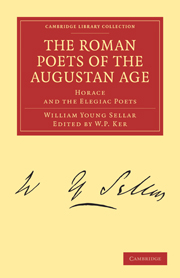Book contents
- Frontmatter
- EDITOR'S PREFACE
- Contents
- Dedication
- WILLIAM YOUNG SELLAR
- HORACE
- CHAPTER I LIFE AND PERSONAL CHARACTERISTICS OF HORACE
- CHAPTER II THE SATIRES
- CHAPTER III HORACE AS A MORALIST
- CHAPTER IV HORACE AS A LITERARY CRITIC
- CHAPTER V HORACE AS A LYRICAL POET—THE EPODES
- CHAPTER VI HORACE AS A LYRICAL POET—THE ODES
- THE ELEGIAC POETS
CHAPTER IV - HORACE AS A LITERARY CRITIC
Published online by Cambridge University Press: 07 September 2011
- Frontmatter
- EDITOR'S PREFACE
- Contents
- Dedication
- WILLIAM YOUNG SELLAR
- HORACE
- CHAPTER I LIFE AND PERSONAL CHARACTERISTICS OF HORACE
- CHAPTER II THE SATIRES
- CHAPTER III HORACE AS A MORALIST
- CHAPTER IV HORACE AS A LITERARY CRITIC
- CHAPTER V HORACE AS A LYRICAL POET—THE EPODES
- CHAPTER VI HORACE AS A LYRICAL POET—THE ODES
- THE ELEGIAC POETS
Summary
Epistles, Book II; Ars Poetica
After finishing the book of Moral Essays in verse, Horace seems to have published no important work for several years; for the Carmen Seculare cannot be called a work of high inspiration, nor, even to so slow and careful a writer as Horace, could it have involved much labour. He had the fastidiousness which shrank from giving to the world anything that was not wanted and anything that was not perfectly finished, and apparently also the dislike to fresh exertion, which is the accompaniment of such fastidiousness. He had produced his sketches and comments on society in his Satires; he had represented the more idealised aspect of his age and expressed its deeper and livelier feelings in the three books of his Odes; and he had summed up his maturer wisdom and reflexion on life in his moral Epistles. He may have felt that he had no new message to give to the world, till he received a command which could not be disregarded, to celebrate in lyrical poetry the victories gained by the stepson of the Emperor over the Alpine tribes of the Tyrol and the Grisons. This fresh call upon his powers proved to him that the fountain of his inspiration was not yet dry, and that he retained the old mastery over his art in which he had no rival or successor.
- Type
- Chapter
- Information
- The Roman Poets of the Augustan AgeHorace and the Elegiac Poets, pp. 102 - 117Publisher: Cambridge University PressPrint publication year: 2010First published in: 1892

